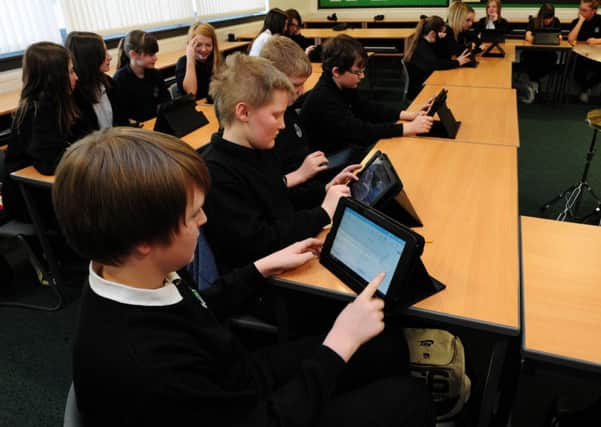Our teachers must rise to 21st Century challenge


IN RECENT years, there has been increasing educational interest in the multi-modal nature of communication – that is, not just verbal and written language but language in conjunction with other modes such as images, audio, body language, layout and so on.
This has led to the realisation that separate school subjects such as English, ICT, expressive arts and mathematics actually have commonalities. All involve learning to combine multi-modal elements to engage the reader and deliver meaning.
Advertisement
Hide AdAdvertisement
Hide AdThroughout the 20th century, English, as a subject, has had to cope with an increasing range of demands: basic skills, cultural heritage, personal expression, functional literacy, media literacy and now multimodal literacy. I would argue all these perspectives have merit and that careful curriculum design should allow all the demands to be addressed across 11-13 years of schooling.
One can see the impact of these perspectives in the current SQA Advanced Higher English qualification, to my mind one of the best qualifications in the SQA catalogue. The current Advanced Higher English course comprises two mandatory units (literary study and specialist study) and one optional unit to be selected from four (language study, textual analysis, reading the media and creative writing). The specialist study leads to a dissertation and students are free to choose from literature, language or media topics.
So far, so good – but reading the report on the 2013 examination, one gets a disturbing picture of English teaching in Scotland. Of 1,743 pupils presented for Advanced Higher English, 68 per cent did the creative writing unit, 30 per cent textual analysis, with reading the media, and language study, at only 2 per cent and 0.1 per cent respectively.
The choice of optional unit is usually determined by the teacher rather than the pupil, so low uptake for media and language units suggests most teachers of English lack both training and confidence to teach these topics. I suspect that many pupils who would benefit from the course decide not to go ahead because options such as reading the media are not available. The 0.1 per cent learning language study translates into two pupils, suggesting only one teacher in Scotland feels capable of taking a linguistic approach to English study.
I find this apparent lack of knowledge of basic linguistics troubling; teaching English and media without some knowledge of linguistics is equivalent to teaching physics without a knowledge of algebra.
However, the current Advanced Higher does at least point the way forward for the future training of teachers of English and suggests that, as well as literature, they need to have studied some element of linguistics and media. Unfortunately I suspect the current “pick ‘n’ mix” modular nature of most undergraduate programmes means many graduates end up with a partial understanding of the core concerns of their chosen discipline.
However, one must congratulate SQA’s course designers with producing a demanding and broad qualification which addresses the multiple demands on the subject. But, alas, this excellent course is about to disappear as all SQA national qualifications have been revised to fit in with the Curriculum for Excellence.
The proposed Advanced Higher English specification (to start in session 2015-16) claims the course could lead to degrees in “business, drama, education, English, humanities, journalism, law, media, and social science” as well as “careers in commerce and industry, education, journalism, law, marketing, media, and politics”.
Advertisement
Hide AdAdvertisement
Hide AdAs communication of complex ideas is a key element of any profession or academic discipline, I would argue this list is unnecessarily restrictive. Why are medicine, mathematics, computing, expressive arts and the sciences missing?
The new Curriculum for Excellence English courses at National and Higher levels seek to develop language skills in the contexts of “literature, language and media”, conforming to the expanded roles for subject English outlined earlier. But, in an astonishing reverse, the new Advanced Higher English prescribes that students analyse “literary texts”, investigate a “literary topic” and produce complex and sophisticated “written texts”. The fact that pupils now inhabit a world supersaturated with devices which communicate via a combination of language, image and audio is ignored.
In my view, what is proposed is not “English” but “English literature”.
How has this reverse come about? Was it done for economic reasons – perhaps a response to the low uptake of the media and language options in the current advanced higher?
The new course specification must have been reviewed by specialists and non-specialists alike. Was there really not a single reviewer brave enough to scrawl all over the draft documents (à la Private Eye) “Shome mishtake, shurely”?
• Rick Instrell is a member of the management committee of the Association for Media Education in Scotland www.mediaedscotland.org.uk
SEE ALSO